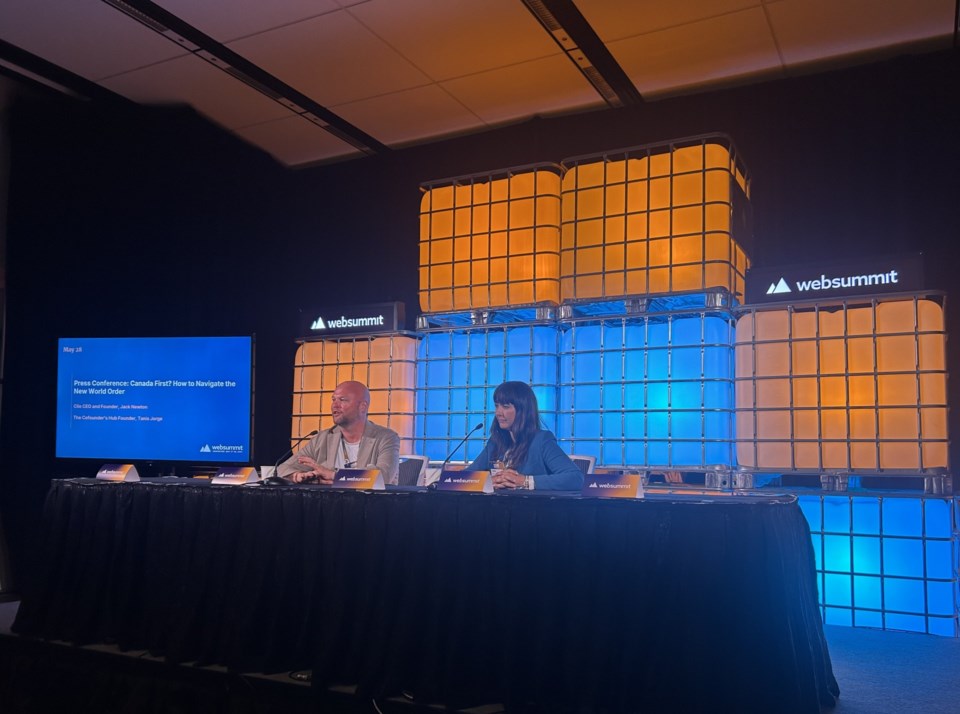Red tape and high living costs are driving Vancouver’s tech workforce to look elsewhere, according to industry execs speaking at the global Web Summit that has drawn thousands to the city’s downtown this past week.
“Having [built] companies in this city for 25 years, I can say we’ve always struggled with [having] enough talent,” Tanis Jorge said at a Web Summit press conference on Wednesday.
The head of The Cofounder’s Hub, a Vancouver-based platform that helps companies navigate partnerships, said affordability issues and stringent regulations are driving companies to eastern Canada and the U.S.
“Entrepreneurs are being hit more and more with requirements from the government,” said Jorge, who is also the co-founder of Vancouver-based global verification company Trulioo Information Services Inc.
“This comes off the bottom line, which in the end, is actually passed onto the consumer.”
The May 27-30 Web Summit is hosting 15,727 attendees and 1,108 startups, according to the conference.
These workforce challenges come at a time of global uncertainty amid an ongoing trade dispute between Canada and the U.S.
Shifts in Canada-U.S. relations have triggered a survival instinct among Canadian businesses in the last few months, said Clio (Themis Solutions Inc.) CEO Jack Newton at the press conference.
"A lot of Canadian executives are looking at this new climate as an existential threat," said Newton, whose company raised US$900 million last year. "If we don't think about how we diversify and hopefully return to a more stable relationship with the U.S."
Stringent immigration policies south of the border could, in theory, open opportunities for Vancouver to attract top talent. During U.S. President Donald Trump’s first term, B.C.’s tech sector capitalized on foreign talent opting for Vancouver over Silicon Valley.
A March 2019 Envoy Global Inc. survey of 400 U.S. hiring professionals showed that 65 per cent of respondents believed Canadian immigration policies were better than American ones. Another 28 per cent said they planned to expand to Canada, and 21 per cent said they already had an office there.
But a similar wave of talent during Trump’s second term has yet to emerge, according to Nathan Wawruck.
Tech workers are currently in wait-and-see mode, the director of permanent placement services in tech at Robert Half Canada Inc. told BIV earlier this month.
Since Trump’s first term, Vancouver’s tech landscape has changed—mainly due to the ever-increasing cost of living—which could be hindering top talent attraction this time around, Wawruck said.
The annual compensation for a software engineer in Vancouver was US$102,700 in 2024, with an average apartment rent of US$1,425 per month, according to CBRE Group Inc.’s Global Tech Talent Guidebook 2025.
Vancouver wages are lower and rents are higher than Toronto, which had an average software engineer compensation of US$108,800 and an average apartment rent of US$1,370 per month.
The CBRE report found Montreal was the most affordable of the two, with an average apartment rent of US$865, while wages were slightly lower than Vancouver’s at US$102,200.
B.C.’s beauty is definitely an attractor for tech talent, but ultimately, that won’t retain the workforce, said Jorge.
“We’re a lifestyle place,” she said. “This young group of people come here for the lifestyle, but they can't see a future here.”
Jorge said government officials should be more knowledgeable on the mechanics of a startup and how talent is retained.
“Can we compete?” she said. “There's a lot of difficult things that are a stumbling block for us right now.”



